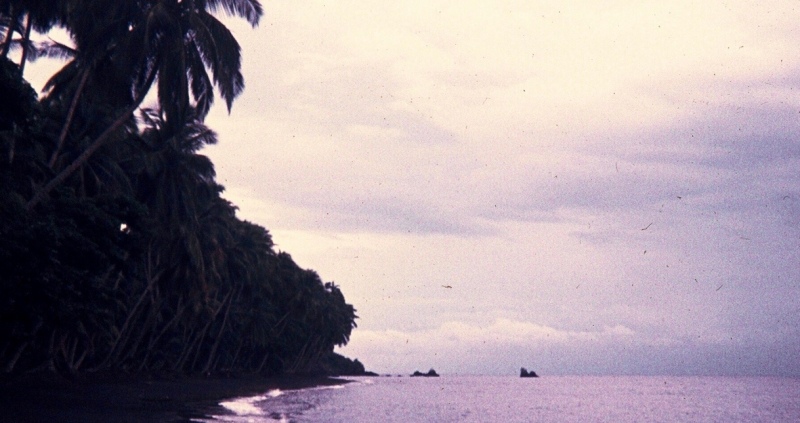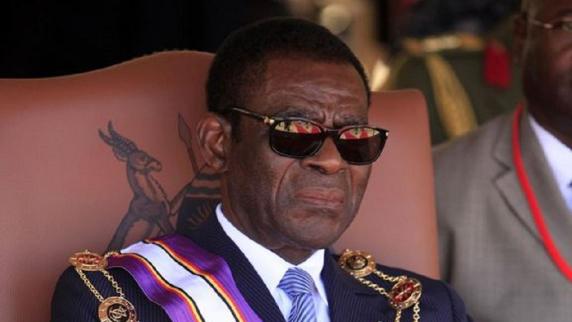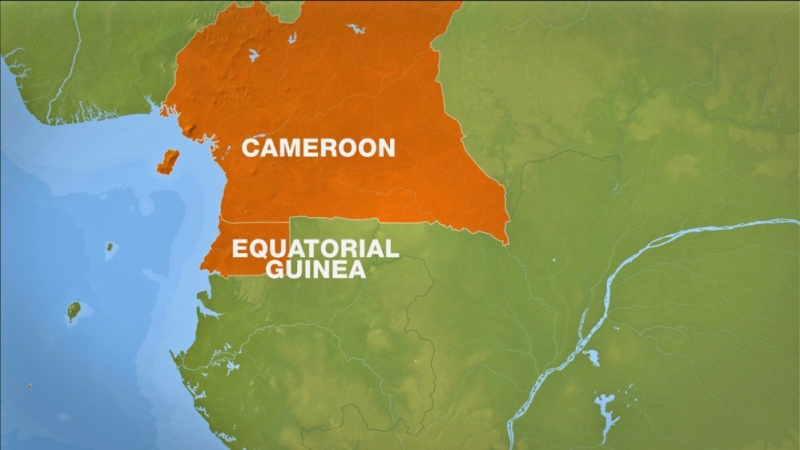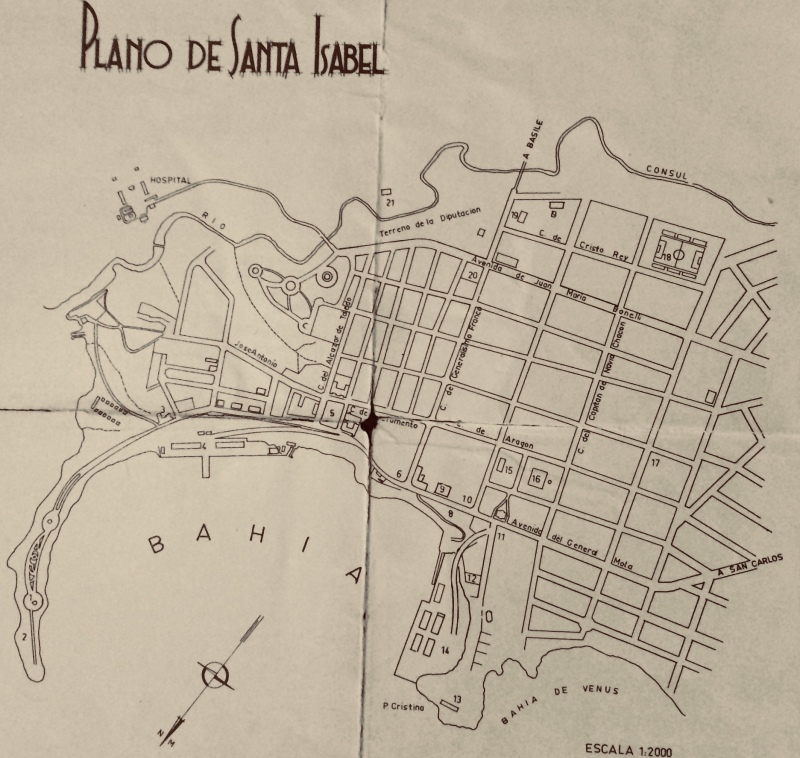I know I promised you a close up look at smallpox, and I’ll get back to that, but I have to tell you about a coup attempt that hits close to home.
Is it for real? Or one more excuse to eliminate opposition voices?
Billions in petro-dollars flow into the miniscule country these days, but many (most?) of the people never see a dime.
They live in poverty.
A tempting target for a coup.
Opposition leaders in my old neighborhood say that since the parliamentary election in November 2017, their members (who won only one seat in the 100-member parliament) are being rounded up, tortured, thrown into prison.
The question remains. Coup? Or excuse for another purge?
The country, the dictator, Black Beach Prison (a half-mile from my 1970 home) and more figure in my upcoming historical memoir Vaccines & Bayonets: Fighting Smallpox in Africa amid Tribalism, Terror and the Cold War
It Only LOOKS Like Paradise

A black sand beach on our former island home – Equatorial Guinea, 1970
In the opening paragraphs of my memoir I write:
PROLOGUE
It was called the Cold War. The powerful hungered for more power. They eyed the resource-rich continent of Africa with its newly and soon-to-be independent countries. Russia and her allies, America and hers, China—they all purchased loyalty with aid. They fought proxy wars. The CIA, the KGB, Israel’s Mossad, and more maneuvered to outwit each other in now widely documented espionage.
In this Cold War context, Carl and I, with our two young children and our ideals, moved to West Africa, assigned first to a country that was always in the news and then to one that should have been.
The first: Nigeria. Home to one in five sub-Saharan Africans. It was embroiled in a tribal/civil war known as the Nigeria-Biafra War. The powerful chose sides. The world watched and wept.
Our second assignment: Equatorial Guinea. A tiny dot on the map, smaller than the U.S. state of Maryland. A blanket of fear muffled its screams. The powerful chose silence. The world didn’t watch, didn’t weep, didn’t even know the place existed….
If you’ve been following my blog or have read my Book Excerpts here on the website, you know that I share some tension-filled moments. All of them true. They’re from our life in West Africa, 1969-1971, with the Smallpox Eradication Program.
That was then. This is now. Different time. Different dictator.
But the January 2018 news rings an all-too-familiar bell.
NOT QUITE THE DOGS OF WAR, NOT QUITE THE WONGA COUP
Frederick Forsyth’s coup in The Dogs of War (1974) is much more fact than the author admits. The fiction is that the book’s coup succeeds in ousting the president of Zangaro, the novel’s Equatorial Guinea. In real life, President Macias went on crushing his people for five more years.
Adam Roberts’s book The Wonga Coup is the vivid and thoroughly-researched account of the 2004 attempt to oust President Obiang who had ousted his uncle Macias. Black Beach Prison was in the future for some of those mercenaries. (Margaret Thatcher’s son Mark helped finance that ill-fated venture.)
During Obiang’s nearly four decades in power there have been multiple coup attempts, or at least the claims of such,
Obiang taking license for another purge each time.
So here we go again.
Some excerpts:
“Equatorial Guinea ‘stops coup attempt by mercenaries'” BBC, Jan 3, 2018
“Mercenaries have attempted to launch a coup in the Western African state of Equatorial Guinea, its government says.
“At least 30 armed men from Chad, Cameroon and the Central African Republic were arrested late last month, a minister said.
“They were found with rocket launchers, rifles and ammunition just over the border in Cameroon, he added.
“The government of President Teodoro Obiang Nguema is often accused of corruption and human rights abuses.”
The article concludes with the statement,
“Equatorial Guinea is one of sub-Saharan Africa’s biggest oil producers, but much of its population still lives in poverty.”
http://www.bbc.co.uk/news/world-africa-42557638
His democracy, his parliament
Before I continue, let me set the scene:
President Obiang: in power nearly 40 years – since 1979 when he overthrew his uncle, President Francisco Macias Nguema. (Obiang was Macias’s right hand man and implemented his uncle’s brutal directives.)
Since Obiang “restored democracy” he has won every election,
by well over 90% of the vote,
winning his fifth 7-year term in 2016.
His party holds 99 seats of the 100-member parliament.
But wait! There’s more!
Freedom in the World 2018 (from Freedom House)
Equatorial Guinea
FREEDOM STATUS: NOT FREE
7/7 Freedom Rating
7/7 Political Rights
7/7 Civil Liberties
Freedom in the World Scores: (1=Most Free, 7=Least Free)
Equatorial Guinea’s Aggregate Score: 7/100 (0=Least Free, 100=Most Free)
https://freedomhouse.org/report/freedom-world/freedom-world-2018
 President Teodoro Obiang Nguema Mbasogo – Photo courtesy Africanews
President Teodoro Obiang Nguema Mbasogo – Photo courtesy Africanews
“Foiled Equatorial Guinea Coup, Cameroonian Mercenaries Complicit” Africanews, Dec 30, 2017
Excerpts from the article say,
“Even though details of the incident are sketchy, there is said to be heightened security measures across the country with reports of swoops on persons believed to be involved….
“Some political and security watchers [are] calling the report a possible move by Malabo [the capital] to purge the military and other security agencies of unwanted elements….”
“‘Equatorial Guinea’s attempted coup began in France’ says President Obiang” The French Television Interview. Latest update Jan 18, 2018
“In an exclusive interview with FRANCE 24 and RFI, Equatorial Guinea’s President Teodoro Obiang Nguema spoke out for the first time about the recent alleged attempt to overthrow him. Speaking in the capital Malabo, he also reacted to last year’s conviction in absentia of his son Teodorin Obiang, in the high-profile ‘ill-gotten gains’ corruption trial in France.”
Obiang denies allegations of torturing the opposition.
“‘I don’t think he died because of mistreatment by police,’ said Obiang, referring to Ebee Ela. ‘He was someone who was ill, maybe, someone who could die in hospital, [or] at home, but if he died when he was arrested, the police are not responsible for it,’ he said. ‘You know when someone is ill, you must take them to the hospital,’ he added.”
France24 and RFI television interview. [French with English interpreter, 16 min.]
Opposition Rejects President Obiang’s denial of torture By Laura Angela Bagnetto 18-01-2018 Modified 18-01-2018 to 14:49 Amanda Lucidon/wikimedia.org
“A political opposition member was tortured to death in front of his party’s headquarters in Malabo, the capital of Equatorial Guinea, by state security personnel, according to an opposition leader. Gabriel Nse Obiang Obono, the head of Malabo-based Citizens for Innovation (CI) party, told RFI that Santiago Ebee Ela did not fall ill and die, in a rebuttal to an exclusive interview with the country’s president.
“‘The president didn’t tell the truth,’ said Obono, who asked for the right to respond after RFI’s Christophe Boisbouvier and France 24’s Marc Perelman interviewed President Teodoro Obiang Nguema in Malabo. [Link to French only recording ]
“’Opposition members were detained just after the elections, they tortured them after a raid on party headquarters in Malabo on December 28,’ said Obono, adding that the party counted some 200 detainees who they can name.
“President Obiang said this was not the case. ‘We can’t use that figure, it doesn’t make sense. I think it’s about 20,’ Obiang told RFI…
“Equatorial Guinea says attempted ‘coup’ thwarted” Al Jazeera, Jan 4, 2018

Equatorial Guinea’s capital, now Malabo, sits on the small island [red] just off the coast of Cameroon. Total land mass of E.G. is a bit smaller than the US state of Maryland.
“….The ‘mercenaries … were recruited by Equatorial Guinean militants from certain radical opposition parties with the support of certain powers’, AFP news agency quoted Nicolas Obama Nchama, the country’s security minister, as saying.”
The article references a Human Rights Watch report that “corruption, poverty, and repression continue to plague Equatorial Guinea” under Obiang’s rule. And further, that “mismanagement of public funds and credible allegations of high-level corruption persist, as do other serious abuses, including torture, arbitrary detention, and unfair trials.”
http://www.aljazeera.com/news/2018/01/equatorial-guinea-attempted-coup-thwarted-180104055905005.html
“Four ‘coup’ suspects fired from the E. Guinea regime” The Independent, Jan 26, 2018
“Malabo, Equatorial Guinea | AFP | Equatorial Guinea President Teodoro Obiang Nguema fired four senior regime officials, including his grandson, in recent weeks on suspicion of collusion with a foiled December ‘coup’, official sources said Thursday….
“Obiang, 75, seized power in the small former Spanish colony in 1979 and has faced a string of coup attempts during nearly four decades in office.
“Critics accuse him of brutal repression of opponents as well as election fraud and corruption.
“Equatorial Guinea has become one of sub-Saharan Africa’s biggest oil producers, but a large proportion of its 1.2 million population lives in poverty.”
My Sad Memories

1968 street map of the capital, then Sta. Isabel, now Malabo. Apprx. one square-mile. Carl and I and our two young children lived three blocks up from the bay.
The news I’ve shared with you today brings back heartbreaking memories of the suffering of the then-infant country caught in a brutal vise.
And what about Teodorin, the Vice President and heir apparent, Obiang’s international playboy son? Like his father, he appears unlikely to share the wealth.
Next time I’ll continue with the news, and also tell you a little bit about Teodorin and his toys.
Thank you for visiting my website and blog. I hope you’ll gain something of value as I continue to post the humorous, the heartwarming and the harrowing about smallpox, Equatorial Guinea and Nigeria. Topics that relate to my just-completed memoir, Vaccines & Bayonets: Fighting Smallpox in Africa amid Tribalism, Terror and the Cold War.
How does the news about Equatorial Guinea make you feel? Had you known the place existed?
Bloesser has written a riveting account of this devestatation. A must read.
Thank you for that comment, Chris. So much sadness in that country. I’m thankful for the opportunity to raise awareness.
Thank you for educating me and others reading this about the serious difficulties in an area of the world that I know nothing about. It is a sad and frustrating situation that I will be praying about, hoping that the “dictator” in this country can be replaced with someone who can understand the difficulties and do something to bring about a change to help the suffering people.
Thank you for that comment. I’m glad to be able to share information about that sad little country. So many people suffering unbelievable trauma. Thank you for visiting my website and blog. I hope you’ll continue to find something educational in my posts.
Lots of interesting material, clearly organized. Fascinating reading. And scary.
Thanks for your comment, Pam. I’m glad you found this post to be – well, yes, I’m glad you found it scary. I’m happy for the opportunity to shine a light on a scary situation that too few know about.
Fascinating and heartbreaking story. I was aware that Equatorial Guinea was a country, but that is pretty much all I knew. I am looking forward to reading, and learning more about, your living history. Thank you for sharing these excerpts.
Mary Lou, if you were aware that Equatorial Guinea is a country you’re ahead of the game. It’s confusing. There are three Guineas on the West African coast and Papua New Guinea in Oceania. Thanks so much for reading and for your comment.
What you’ve described so clearly in your writing, is bringing clarity to an unaware audience. And action begins with understanding. Keep up the good work
Thanks, Janice. I’m glad I can contribute in some small way to greater understanding of a little-known tragedy.
We think we get world news, but you show how naive that perception is. Without authors like you there would be many more holes in the stories we tell about the past and present. Stories that give us the chance to learn and change and grow as human beings. You started caring and helping in the ’70s, and your book shows how the people of Equatorial Guinea are still in your heart. What an amazing book!
Thanks, Laura. It’s so rewarding to get the word out and then find that it has connected with people like you–people who want to know about the suffering in an obscure little corner of our planet. Thank you for reading and for your comment.
What a fine website! Your writing and your research are impressive! We don’t know much about Africa, and much less abut this part of Africa. You are making an important addition to Historical reporting!
Carmen, thank you for those very encouraging words. There’s so little that’s been written about Equatorial Guinea, either in the past or currently. The stories that do make it into the news are primarily in the international press. I’m thankful for the opportunity to pass them on to you, who can then share it to a wider audience. Thanks for visiting my website and blog.
We should all speak our passions. Thank you for sharing yours. I’ve recently been able to add BBC News to my streamed news on TV and I love being able to watch Africa News programs, as well as just “news” that is not all political opinion as is the case on US national news.
I cannot help but spread awareness of that beautiful little country and it’s tragic state. Thank you, Nancy, for your comment and for helping to spread the word.
What a fascinating read, fascinating and heart-breaking. What a difficult and oppressive tyrannical government to be living under. So sad for the people of this country and the unnecessary hardships they are experiencing.
Thank you for your comment, Tess. My heart just hurts for those people, and I’m thankful that I can shed some light on the tragedy.
What a terrible and heartbreaking situation! Sometimes I feel that nothing will change in this part of the world. These leaders never learn from their own history and it is the country that suffers. Thank you for sharing Bee!
Thank you, dtills, for reading and for commenting. Yes, it is heartbreaking. I wish I could say that there’s some brighter news coming up. Unfortunately, I just received another grim report. I’m about to prepare another post which I hope to share tomorrow. Thanks again.
Hope to see you at the next bloggers meeting!
I am indeed aware of Equitorial Guinea and its roots, but I was not aware they are struggling today in this way and not unlike too many other African nations. What a unique topic. I look forward to reading and researching this more. Thank you for sharing!
Thank you, Nefertiti. It is a treat to encounter someone who is familiar with Equatorial Guinea. I’ll enjoy hearing about how you happen to be acquainted with E.G. Thanks for your comment.
Thank you sir for the information.
Thank you, Anyor, for reading my post and responding. Sometimes it’s not easy to see this, but the blog is just one page of my website. You may enjoy seeing some old photos from Kano, Equatorial Guinea and Cameroon on my other pages. All best wishes.
wow, very sad. The people sound courageous. Even with the dangers, they still formed the opposition party. Not many people would stand up like that knowing it makes them a target.
Kayla, I think about that so often. I love those people. I’m in awe of those who have the strength to be a part of the opposition when they know they may be signing their own death warrant. Thank you so much for your comment.
I knew that Equatorial Guinea existed because when I started teaching years ago, this fabulous social studies teacher had a huge middle school unit on the continent of Africa. Students would eagerly share what they knew, so I got to know many country and city names. Sadly, with curriculum revisions, Africa is no longer covered during middle school beyond Ancient Egypt. The focus is mostly Euro-centric with a bit of Indian and Chinese culture thrown in.
Thanks, Irene. I’m always glad to hear it when someone knows something about Equatorial Guinea. A cloak of secrecy descended over the country within months of its independence from Spain. That was October 12, 1968. Almost no news could get out until journalists were allowed again in 1979. I hope to shed some light when my memoir is published.
Now, you may have seen in today’s (Feb 9) post on this blog that EG has just blocked Facebook, WhatsApp and VPNs. I appreciate your visiting my blog and getting back to me.